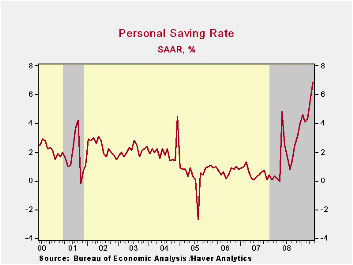 Global| Jun 26 2009
Global| Jun 26 2009U.S. Personal Income Surge Lifts Savings Rate To Its Highest Since 1993
by:Tom Moeller
|in:Economy in Brief
Summary
The economic recession continued to damp growth in wages last month, but "automatic stabilizers" kicked in to pick the slack. The result was a 1.4% jump in May personal income which was the largest monthly increase in a year. The rise [...]

The economic recession continued to damp growth in wages last month, but "automatic stabilizers" kicked in to pick the slack. The result was a 1.4% jump in May personal income which was the largest monthly increase in a year. The rise owed to an 8.0% jump (12.2% y/y) in government payments which included a 3.5% (190.4% y/y) surge in unemployment insurance benefits and a 21.0% jump in "other" payments. As might be expected given the recession, these gains offset severe weakness in the income earned in the private sector. Wages & salaries slipped 0.1% (-1.1% y/y) for the eighth decline in the last nine months. In addition, the decline in interest rates took its toll on interest income which in May was off 5.5% y/y while the corporate sector paid fewer dividends (-5.2% y/y) as earnings fell.
Lower taxes added further to the income gains fueled by direct payments from the government. Tax payments were down nearly 20% since December. That lifted disposable personal income at a 10.8% annual rate so far this year and by 1.6% just during last month. Adjusted for inflation, real disposable income also has been quite firm and posted a 1.6% increase last month and is up at a 9.0% annual rate since December
With the recession, consumers have entered a cautious mode and they're letting the income gains rebuild their balance sheets. As a result the personal savings rate jumped again, last month to 6.9% which was the highest level since December of 1993.
Spending restraint was evidenced by the slight 0.3% rise in May personal consumption expenditures. That followed no change during April which was slightly better than a 0.1% decline reported last month. Adjusted for low inflation, May spending rose 0.2%. However, the 1.9% year-to-year retrenchment in real spending was near the fastest rate at which spending has ever been bulled back. The good news is that consumers seem to have grown tired of not spending. So far this year real personal consumption has risen at a 1.5% annual rate. 
The consumption details may suggest, however, that the idea of a stabilization still may be a stretch. Real spending on motor vehicles seems to stabilizing and rose 2.4% last month (-16.4% y/y) and it's actually up at a 4.3% annual rate since December. Real spending on furniture & appliances also seems to be stabilizing though it's still down -5.6% y/y. Real spending on apparel made up for an April decline with a 0.2% increase (-7.4% y/y). Spending on services again was roughly unchanged (0.9% y/y).
Finally, all this spending restraint held back the PCE chain price index to a 0.1% uptick. The gain matched the rise in core prices and the annual rate of increase dropped to 1.8%. The latest increase in prices matched Consensus expectations.
The personal income & consumption figures are available in Haver's USECON and USNA databases.
| Disposition of Personal Income (%) | May | April | Y/Y | 2008 | 2007 | 2006 |
|---|---|---|---|---|---|---|
| Personal Income | 1.4 | 0.7 | 0.3 | 3.8 | 6.1 | 7.1 |
| Disposable Personal Income | 1.6 | 1.3 | 0.2 | 4.6 | 5.5 | 6.4 |
| Personal Consumption Expenditures | 0.3 | 0.0 | -1.8 | 3.6 | 5.5 | 5.9 |
| Saving Rate | 6.9 | 5.6 | 4.8 (May '08) | 1.8 | 0.5 | 0.7 |
| PCE Chain Price Index | 0.1 | 0.1 | 0.1 | 3.3 | 2.6 | 2.8 |
| Less food & energy | 0.1 | 0.3 | 1.8 | 2.2 | 2.2 | 2.3 |
Tom Moeller
AuthorMore in Author Profile »Prior to joining Haver Analytics in 2000, Mr. Moeller worked as the Economist at Chancellor Capital Management from 1985 to 1999. There, he developed comprehensive economic forecasts and interpreted economic data for equity and fixed income portfolio managers. Also at Chancellor, Mr. Moeller worked as an equity analyst and was responsible for researching and rating companies in the economically sensitive automobile and housing industries for investment in Chancellor’s equity portfolio. Prior to joining Chancellor, Mr. Moeller was an Economist at Citibank from 1979 to 1984. He also analyzed pricing behavior in the metals industry for the Council on Wage and Price Stability in Washington, D.C. In 1999, Mr. Moeller received the award for most accurate forecast from the Forecasters' Club of New York. From 1990 to 1992 he was President of the New York Association for Business Economists. Mr. Moeller earned an M.B.A. in Finance from Fordham University, where he graduated in 1987. He holds a Bachelor of Arts in Economics from George Washington University.
More Economy in Brief
 Global| Feb 05 2026
Global| Feb 05 2026Charts of the Week: Balanced Policy, Resilient Data and AI Narratives
by:Andrew Cates






